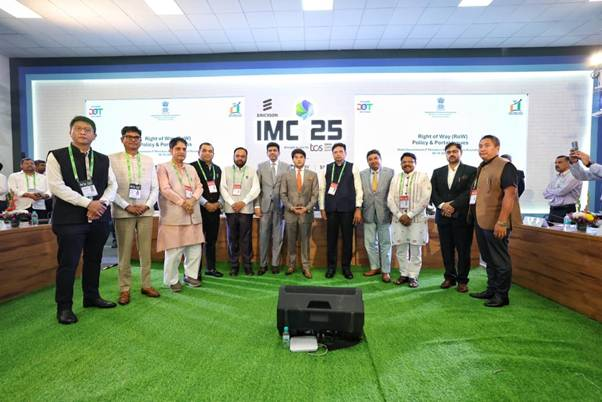India, GSMA, and NCA Partner to Advance Telecom Policy and Digital Capacity
The MoU lays out a broad framework for collaboration between NCA and GSMA, aligning with the Digital India vision and India’s aspirations to become a global leader in telecom innovation.

- Country:
- India
At the India Mobile Congress (IMC) 2025 in New Delhi, the Department of Telecommunications (DoT), the National Communications Academy (NCA), and the GSM Association (GSMA) signed a landmark Memorandum of Understanding (MoU) to deepen cooperation in telecom policy, research, training, and capacity building. The agreement was signed in the presence of Hon’ble Minister of Communications Jyotiraditya M. Scindia and Secretary (Telecom) Dr. Neeraj Mittal, symbolizing India’s growing commitment to shaping the next generation of digital communication frameworks.
The MoU was officially inked by Mr. Vivek Badrinath, Director General, GSMA, and Mr. Atul Sinha, Director General, NCA. Senior GSMA officials, including Mr. John Giusti, Chief Regulatory Officer, and Mr. Julian Gorman, Head of APAC, were also present.
Key Objectives of the Collaboration
The MoU lays out a broad framework for collaboration between NCA and GSMA, aligning with the Digital India vision and India’s aspirations to become a global leader in telecom innovation. Under this partnership, the organizations will:
-
Advance policy development and regulatory practices through joint research and analysis on emerging issues in telecommunications.
-
Promote digital inclusion and socio-economic development by focusing on bridging the digital divide and supporting sustainable connectivity initiatives.
-
Collaborate on frontier technologies such as 5G, 6G, Artificial Intelligence (AI), Internet of Things (IoT), quantum communications, and spectrum management to prepare India for next-generation challenges.
-
Facilitate knowledge sharing through workshops, training programs, and international exposure initiatives designed to enhance leadership and institutional capacity in telecom regulation.
Building Capacity for a Digital Economy
The NCA-GSMA partnership represents a critical step toward strengthening India’s institutional and policy ecosystem in telecommunications. It will help develop world-class training modules for government officials, industry leaders, and policymakers—ensuring that India not only adapts to global standards but also contributes to shaping them.
The collaboration is expected to support India’s participation in global telecom standard-setting bodies, further aligning national regulatory practices with international best practices. This initiative also reinforces India’s push toward self-reliance and indigenous innovation, key pillars of the government’s “Atmanirbhar Bharat” vision.
Voices from the Leadership
In his opening remarks, Sh. Atul Sinha, Director General of NCA-T, emphasized the transformative nature of the collaboration:
“Today we formalize a partnership that is simple in its design yet transformative in its promise—to build the next generation of policy and regulatory capability for India’s digital communications sector. Networks are no longer mere utilities; they are the operating system of our economy—powering inclusion, innovation, public services, and national security.”
Mr. Vivek Badrinath, Director General of GSMA, underscored the significance of the partnership in strengthening India’s digital leadership:
“We’re delighted to work with the National Communications Academy and the Department of Telecommunications to drive forward this joint commitment to policy, training, and capacity building. Together, we aim to realize Digital India’s vision and bring the benefits of mobile technology to millions.”
Enabling India’s Global Leadership in Telecom
With this agreement, India positions itself at the forefront of the global telecom revolution. The NCA-GSMA collaboration is expected to catalyze innovation, foster human capital, and integrate global policy expertise into India’s fast-evolving digital infrastructure.
By promoting research and knowledge exchange, the partnership will not only strengthen India’s domestic regulatory ecosystem but also enhance its influence in global digital governance and telecom standardization forums. This will ensure that India’s policy frameworks remain agile, forward-looking, and inclusive—supporting both industry growth and citizen empowerment.










